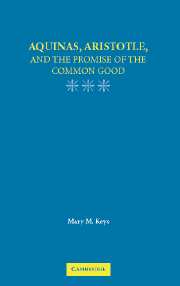Book contents
- Frontmatter
- Contents
- Acknowledgments
- PART I VIRTUE, LAW, AND THE PROBLEM OF THE COMMON GOOD
- PART II AQUINAS'S SOCIAL AND CIVIC FOUNDATIONS
- PART III MORAL VIRTUES AT THE NEXUS OF PERSONAL AND COMMON GOODS
- PART IV POLITICS, HUMAN LAW, AND TRANSPOLITICAL VIRTUE
- 8 Aquinas's Two Pedagogies: Human Law and the Good of Moral Virtue
- 9 Theological Virtue and Thomistic Political Theory
- Works Cited
- Index
9 - Theological Virtue and Thomistic Political Theory
Published online by Cambridge University Press: 25 July 2009
- Frontmatter
- Contents
- Acknowledgments
- PART I VIRTUE, LAW, AND THE PROBLEM OF THE COMMON GOOD
- PART II AQUINAS'S SOCIAL AND CIVIC FOUNDATIONS
- PART III MORAL VIRTUES AT THE NEXUS OF PERSONAL AND COMMON GOODS
- PART IV POLITICS, HUMAN LAW, AND TRANSPOLITICAL VIRTUE
- 8 Aquinas's Two Pedagogies: Human Law and the Good of Moral Virtue
- 9 Theological Virtue and Thomistic Political Theory
- Works Cited
- Index
Summary
He that knows the highest cause in any particular genus, and by its means is able to judge and set in order all the things that belong to that genus, is said to be wise in that genus, for instance, in medicine or architecture, according to I Cor. 3:10, “As a wise architect, I have laid a foundation.” On the other hand, he who knows the cause that is simply the highest, which is God, is said to be wise simply, because he is able to judge and set in order all things according to divine rules.
Aquinas, ST, II–II 45, 1; cf. SCG I.1.1If Aquinas's case for a moderate yet ennobling legal pedagogy of ethical virtue is judged persuasive, we may nonetheless be troubled by the case Aquinas appears to mount in the ST for the political enforcement of the religious, supernatural, or specifically Christian virtues of faith, hope, and charity. These three theological virtues are linked in Aquinas's schema to a number of infused moral virtues, which unlike their natural counterparts are not acquired by dint of moral training and habituation, but are rather gratuitous gifts from God allowing a person to orient all of his or her actions and attitudes toward friendship and union with God, towards membership in God's household and good citizenship in the heavenly City (cf. ST I–II 63, 4).
- Type
- Chapter
- Information
- Aquinas, Aristotle, and the Promise of the Common Good , pp. 226 - 238Publisher: Cambridge University PressPrint publication year: 2006



